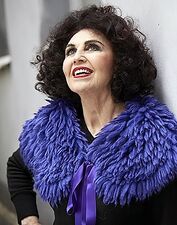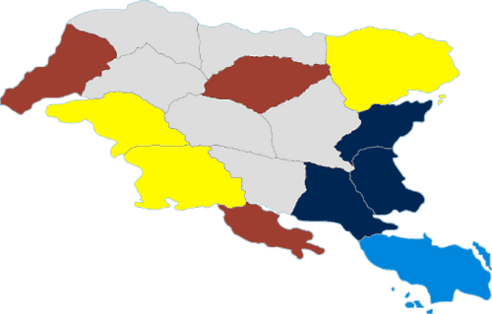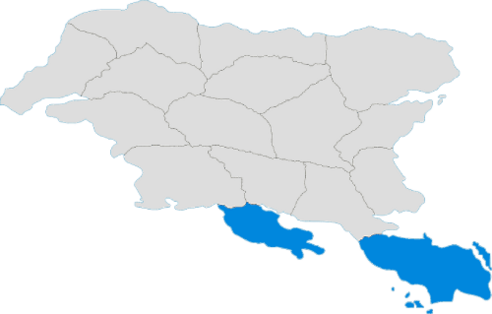Gylian presidential election, 2014
| |||||||||||||||||
| Turnout | 93,5% | ||||||||||||||||
|---|---|---|---|---|---|---|---|---|---|---|---|---|---|---|---|---|---|
| |||||||||||||||||
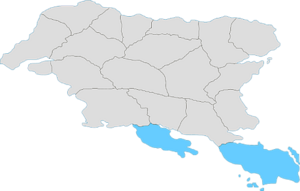 | |||||||||||||||||
| |||||||||||||||||
A presidential elections was held in Gylias on 22 January 2015.
Incumbent Carmen Dell'Orefice was re-elected, defeating Union for a New Republic candidate Electra Galanou.
Procedure
The election was held through instant-runoff voting.
Candidates were registered with Elections Gylias in accordance with normal procedures. They could either be nominated by a political party or electoral bloc, civic organisations, or self-nomination as independents.
Candidates
| Candidate | Nominator | Office(s) held | Details | ||
|---|---|---|---|---|---|
| Carmen Dell'Orefice | 
|
Independent | President of Gylias (since 2011) |
Campaigned on promotion of aristerokratia. | |
| Electra Galanou | 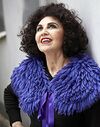
|
Union for a New Republic | Chief executive of Omicron Group (since 1961) |
Campaigned on promotion of economic nationalism and disability rights. | |
| Helena Bonham | 
|
Liberal Union | None | Campaigned as the main liberal candidate. | |
| Keie Nanei | 
|
Independent | None | Campaigned on a satirical platform. | |
| Amanda Leloup | 
|
OMFLG–ACFEN | Governor of Nezyál (1970–1978) |
Campaigned on promotion of francité. | |
| Victoria Cavallo | 
|
Independent | None | Campaigned on a satirical platform. | |
| Saeni Rotara | 
|
Humanist Party | None | Campaigned on promotion of the arts and culture. | |
Results
| Candidate | Nominator | First count | % | Final count | % | |
|---|---|---|---|---|---|---|
| Carmen Dell'Orefice | Independent | 2.681.807 | 16,1% | 9.064.506 | 59,8% | |
| Electra Galanou | UNR | 2.665.149 | 16,0% | 6.093.531 | 40,2% | |
| Helena Bonham | LU | 2.663.484 | 16,0% | |||
| Keie Nanei | Independent | 2.416.957 | 14,5% | |||
| Amanda Leloup | OMFLG–ACFEN | 2.398.634 | 14,4% | |||
| Victoria Cavallo | Independent | 1.832.290 | 11,0% | |||
| Saeni Rotara | HP | 1.798.976 | 10,8% | |||
| Others/write-ins | 199.886 | 1,2% | ||||
| Total | 16.657.183 | 100% | 15.158.037 | 100% | ||
| Registered voters and turnout | 18.178.744 | 93,5% | ||||
Maps
Analysis
Having defeated the sitting president Laura Varnaþ in 2011, incumbent Carmen Dell'Orefice went into the election in a strong position. She was one of Gylias' most popular presidents, and her "silver fox" reputation and identification with aristerokratia were huge advantages. She was particularly ecstatic that, while Gylias' oldest president, she enjoyed great popularity among young voters, who admired her elegance and commitment to fighting ageism.
The Progressive Alliance did not nominate a candidate after Laura's loss in 2011. Instead, leftists swung their support behind Carmen's re-election.
The National Bloc did not nominate a candidate after Yseult Roxane Danesh's poor showing in 2011. Instead, the conservative mantle was taken by the Union for a New Republic's candidate Electra Galanou, who had previously finished third in 1986.
A somewhat surprising nomination was Helena Bonham as the Liberal Union's candidate. A well-established, beloved character actress known for her quirky roles, Helena was also the grand-daughter of famed "anarcho-liberal" Violet Bonham, and accepted nomination in part due to an interest in "living up to the family name".
Confounding expectations, Helena ran a serious campaign, marked by erudite speeches that placed her in the liberal socialist tradition of the Free Territories. Arguably her sole concession to her cinematic fame was dressing in deliberately anachronistic Alscian fashions, but this mainly drew comparisons to Gylias' first president, Reda Kazan.
Voters also enjoyed a strong line-up of colourful candidates: columnist Keie Nanei (a returning candidate from 2003), comedian Victoria Cavallo (whose signature promise was organising a referendum on making "Arise, Gylians" the national anthem), and writer Saeni Rotara, who sought the Humanist Party nomination due to discomfort with running as an independent.
In the first round, Carmen obtained a surprisingly narrow plurality of 16,1% of first preference votes, and carried 5 regions. Electra took second place, overtaking Helena by only 1.665 votes. Helena registered a strong performance despite narrowly missing out advancing to the final round, winning pluralities in Tomes thanks to a sweep of Ðoron and Kaşa, and coming within 0,5% of overtaking Electra in Nerveiík-Iárus-Daláyk.
Keie's fourth place finish and 14,5% of first preference votes represented a 4,3% decline from her 2003 performance, but she still managed to win pluralities in Kausania and Envadra. Amanda trailed only 0,1% behind, and retained pluralities in Nezyál, Herlan, and Aðuna.
Victoria won 11% of first preference votes, coming second in Arxaþ, and Alţira, but not managing to win a regional plurality. Conversely, Saeni finished last, but picked up much of the "non-inscrit left" vote that hadn't gone to Carmen, managing pluralities in Mişeyáke, Sváen, Nauras, and Tandar.
In the final round, Carmen generally gained transfers from Helena, Amanda, and Saeni's voters. Keie and Victoria's voters were more unpredictable with their preferences. In the end, Carmen defeated Electra by nearly 3 million votes, obtaining a larger majority than Gianna Calderara in 2003.
Carmen won majorities in 18 regions compared to Electra's 2, making Electra the poorest-performing runner-up since 1975. Electra only managed to gain Nauras from Saeni.

